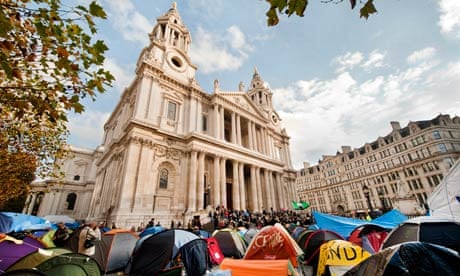Ten weeks after the tents of Occupy movement were removed from outside St Paul's cathedral, a group has been launched seeking to cement the ties between churchgoers and activists with a march from London to Canterbury demanding social justice and greater economic equality.
A newly formed group called Occupy Faith, inspired in part by a similar project in the US, announced plans on Tuesday for the so-called pilgrimage for justice, a 12-day trek next month between St Paul's and Canterbury cathedral, the seat of global Anglicanism, supported by a range of activist and faith groups, including those from other religions.
The event, which begins on 7 June, forms part of a wider alliance that grew from the initially accidental collision of church and protest, which began when the Occupy camp based itself next to St Paul's for more than four months.
Occupy had initially hoped to pitch their tents outside the headquarters of the London Stock Exchange nearby but changed their plans when police blocked this.
Organisers hope more than 100 people could join the pilgrimage walk, which takes a deliberately urban route through places including Dartford, Gravesend and Rochester in Kent, where it will be addressed by the Bishop of Rochester.
Given that almost half the UK population professes some sort of faith, religious groups had "a moral obligation to discuss and support these issues, and seek an economic alternative that will be beneficial to everyone and not just the few", said Tanya Paton from Occupy Faith, launching the walk at St Paul's.
The group claims the official support of both St Paul's, which will provide someone to bless the marchers before they depart, and Canterbury cathedral, which is laying on a venue for a post-walk ecumenical service.
But the attitude of senior Church of England figures is actually more ambiguous, mirroring the conflict of the Occupy camp which saw two senior clerics leave St Paul's amid a fierce debate over whether the cathedral should be supportive.
A St Paul's spokesman said the cathedral was "pleased to send Occupy Faith UK's pilgrimage for justice on its way with our prayers" but offered no specific endorsement.
Similarly, Canterbury cathedral said its backing extended no further than a room in its Chapter House for the post-walk service.
A spokesman said: "We are very sympathetic to calls for social justice, though I'd be surprised if you'd find any Christians saying otherwise. Having said that, we are not convinced that the Occupy movement is the best way to try and further those aims."
A spokesman for the wider Church of England conceded that there was "a wide range of views among church members about these issues". He added: "Not all may necessarily agree with Occupy's methods, but that movement has certainly raised important questions which go to the heart of the Church's engagement with society."
Occupy generally has far more support among ordinary churchgoers than those at the top, said Jonathan Bartley of the Christian thinktank Ekklesia. "There's a big split between the bureaucrats and the people in the queues," he said, saying Church of England commissioners, managing a £5bn portfolio on behalf of the church, would be seen as being "in bed with the system".
Bartley said: "What Occupy did was it woke up a lot of local congregations, both to what their own church is doing, but also that there are alternatives. The bureaucrats probably risk alienating themselves from their own church if they're not engaged in this."

Comments (…)
Sign in or create your Guardian account to join the discussion